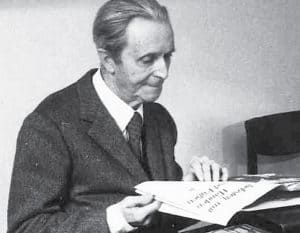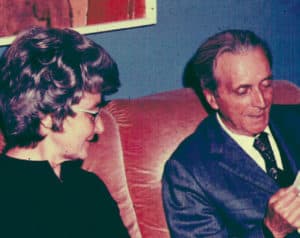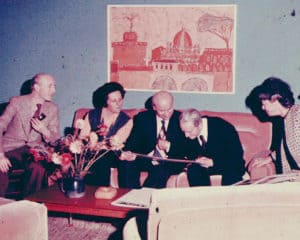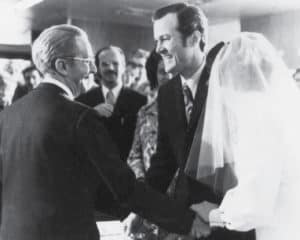Born in 1894 into a poor, profoundly Catholic family in Tivoli, Italy, Igino Giordani’s parents could not guarantee regular schooling for they worked as manual laborers. But the young Igino was noted for his intelligence, and a rich gentleman for whom he worked, impressed by his acumen paid for him to study at the seminary, not to become a priest but to be one of the most brilliant diplomats at that time. As he finished his studies, the First World War broke out and soon he went to the trenches. He never fired a shot against his enemies, because Christianity forbade murder. As a result of this brave choice, he was gravely wounded.

of Igino Giordani on politics
Whilst he was in the military hospitals, he graduated in Literature and Philosophy. Although a lover of peace, Igino Giordani became an officer in the First World War where he was wounded and awarded a medal of honor.
He married in 1920. He and his wife Mya had 4 children, and began working for the newly formed Italian Christian political party, founded by Luigi Sturzo. The Fascist regime destroyed freedom and rights, and even Igino was persecuted. From this period, we still have some of his famous writings denouncing fascist violence. On returning to Italy from a journey to the United States, he became a director in the Vatican Library. From there, he also directed the journal ‘Fides,’ which was known in Catholic environments throughout the world. It was through them that the rebirth of a post-fascism Catholic political party came about, Christian Democracy. After the Second World War, as an anti-fascist, he was forced into exile but later became elected to the Italian Parliament.
1948 – A turning point
1948 was a decisive year in his life: he was 54, and a man established in politics and culture. He met Chiara Lubich, a young woman aged 28, in whom he found extraordinary spiritual inspiration. He adhered fully to the Focolare Movement and, at Chiara’s side, he took on an important role building the Movement and deepening its social doctrine, to the point of often being designated by Chiara as co-founder.
 Of special note, the deep spiritual relationship with Chiara was the start of the intense mystical period known as “Paradise ’49.” From then, Chiara clearly saw through Giordani’s life, confirmation that the ideal of unity was made for all, and was a gift for the whole of humanity. Igino was the first married focolarino of the Focolare Movement.
Of special note, the deep spiritual relationship with Chiara was the start of the intense mystical period known as “Paradise ’49.” From then, Chiara clearly saw through Giordani’s life, confirmation that the ideal of unity was made for all, and was a gift for the whole of humanity. Igino was the first married focolarino of the Focolare Movement.
He was the one credited with bringing lay married people and families into the Focolare as active members, opening the Movement – in a certain sense – to the entire human family.
His encounter with Chiara took place in his office at the House of Representatives in Montecitorio, in September 1948. He was going through a particularly difficult moment in his life, both spiritually and politically: “I studied religious topics with a passion,” he writes in his Memorie di Un Cristiano Ingenuo, “but mostly so that I would not have to think about my soul whose appearance wasn’t very edifying.
 It was burdened with boredom and, in order not to have to admit to its paralysis, I buried myself in books and tired myself with activity.
It was burdened with boredom and, in order not to have to admit to its paralysis, I buried myself in books and tired myself with activity.
I believed this was all I could do. I had grasped and possessed a bit from all the areas of religious culture: apologetics, ascetics, mysticism, dogmatics and morality… but I possessed them only as a matter of culture. They weren’t integrated with my life.”
On that day, an assorted group appeared at his desk, whose originality immediately struck someone like Giordani who was rather expert on ecclesial life: a Conventual Franciscan, a Friar Minor, and a Capuchin, a man from the Third Order and a woman from the Third Order (Chiara).
He would later write: “To see them united in such harmony already appeared like a miracle of unity!” Chiara spoke first, while perceiving the courteous scepticism of the Member of Parliament: “I was sure I would hear a lot of sentimental dribble about some utopian welfare scheme.” But that wasn’t the case at all! “There was an unusual tone in her voice,” he later commented, “a sense of deep certainty and conviction that seemed to come from something supernatural.
Suddenly, my curiosity was aroused and a fire began to blaze within me. A half hour later, when she had finished speaking, I found myself completely taken by an enchanted atmosphere: enclosed in a halo of happiness and light; and I would have wanted that voice to continue speaking. It was the voice that I, without realizing, was waiting to hear. It placed holiness within the reach of everyone.”
Giordani asked Chiara to write down what she had just said, and she quickly did. But personally, Giordani wanted to know more about his new acquaintances. He gradually came to discover in his experience of the Focolare, the deep desire of St. John Chrysostom: that the laity might live as the monks but without celibacy. “This desire had always been so strong in me,” he went on to say, “and so I had always the Franciscan style
of teaching among the people and the virginal instruction given by St. Catherine of Siena to the Dominican Third Order.
And I supported all the initiatives to bring down the walls placed between the monastic life and the laity, between the consecrated and the common folk… Something happened in me. Those chunks of culture that had always been standing side by side for comparison began to move and come alive, to become a living body that was generously flowing with blood. Love had entered in and invested those ideas, and its gravitational pull drew them into an orbital path of gladness.”
A Man of Peace and Unity
Due to some courageous political decisions (pacifism and unity in spite of the ideological differences, or because of them), in Parliament, he became considered as a Christian Democrat out of step, and as a result was not re-elected. This was the time to dedicate himself more to the Focolare Movement, to contribute to the debate in the Church carrying forward themes that would be understood in the Second Vatican Council (above all, concerning the mission of the laity).
 He became the director of the newly created ‘Città Nuova’ (New City) magazine in 1959, and from 1961 became director of Centro Uno, a body within the Focolare Movement working in the ecumenical field. In 1965, he was nominated president of the international institute Mystici Corporis in Loppiano. After the death of his wife and with the agreement of his children, he lived the last seven years of his life in a “Focolare” household. He left this earth on April 18, 1980. The process towards his canonization has begun.
He became the director of the newly created ‘Città Nuova’ (New City) magazine in 1959, and from 1961 became director of Centro Uno, a body within the Focolare Movement working in the ecumenical field. In 1965, he was nominated president of the international institute Mystici Corporis in Loppiano. After the death of his wife and with the agreement of his children, he lived the last seven years of his life in a “Focolare” household. He left this earth on April 18, 1980. The process towards his canonization has begun.
Igino Giordani was an intellectual difficult to label: we cannot describe him as a political thinker or journalist, or scholar of ancient Christian literature, or a writer of the lives of saints or history, in the hope of being able to sufficiently express his talents. He was driven by a great passion and was spurred into public life through a wide range of interests.
It is said that “for him writing was life,” therefore, an understanding of the figure of Giordani could almost easily come through analysis of his writings. He wrote about 100 books and more than 4,000 newspaper articles.
source: www.focolare.org




